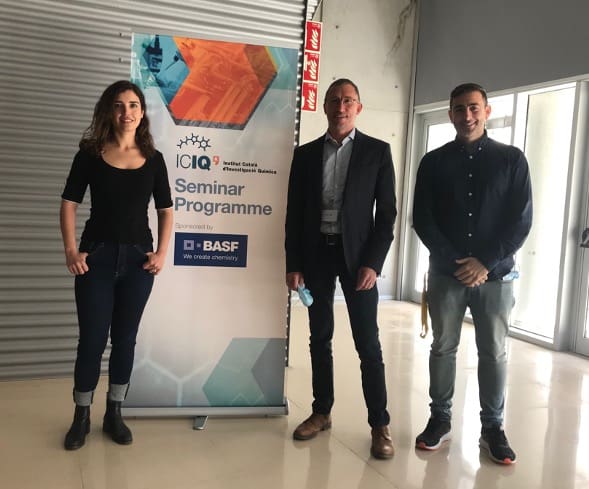
 08/04/2022
08/04/2022
 12:00 h
12:00 h
- Lecturer: Dr. Christophe Detrembleur
- University: CESAM Research Unit - University of Liège (Belgium)
- Sponsored by:

Carbon dioxide for the sustainable construction of functional polymers and organic materials
The valorization of waste carbon dioxide into valuable engineering plastics is becoming a vibrant research field. By diversifying the renewable resources for the sustainable production of organics, routes to efficiently turn CO2 into polymers1 are expected to accelerate and facilitate the transition from existing fossil-based products to future generations of more sustainable materials.
In the first part of this talk, we will discuss how CO2 can be exploited to construct more sustainable non-isocyanate polyurethane (NIPU)-based products of prime importance, i.e. foams and coatings. These applications represent the main part of the conventional polyurethane business. We will first describe a facile, robust and solvent-free process for constructing flexible and rigid self-blown NIPU foams.2 In this process, CO2 participates to the construction of the polymer matrix and to its foaming following divergent or domino approaches, depending on the process involved. We will also show that these crosslinked foams are easily repurposed into second life materials (coatings and structural composites), which offers enormous perspectives for the next generation of greener and recyclable non-isocyanate PU foams. We will then report how NIPU hydrogels can be produced in water at room temperature under catalyst-free conditions with impressive short gel times.3 Their exploitation for the facile preparation of indoor air depolluting coatings will be illustrated. These two families of products (foams, hydrogels/coatings) can be easily scaled-up, opening new opportunities in the design of more sustainable materials while valorizing CO2 as a renewable carbon feedstock.
In the second part of the talk, we will describe a novel family of highly reactive CO2-based cyclic carbonates that gives access to new regioregular functional non-isocyanate polyurethanes (e.g. poly(oxo-urethane)s and poly(oxazolidone)s), polycarbonates and sulfur-containing polymers by copolymerization with readily available and cheap comonomers at room temperature.4 We will discuss the reactivity of these novel monomers but also some unexpected, however highly appealing, side reactions that can be pushed further to construct novel functional polymers4 or elusive organic compounds5. If time permits, we will discuss how some of these polymers can be upcycled into second-life products in a circular economy perspective.
References.
- Detrembleur/Kleij et al. Soc. Rev. 2019, 48, 4466.
- Detrembleur et al. Chem. Int. Ed. 2020, 59, 17033 ; WO2021/004993A1; ACS Macro Lett. 2022, 11, 236; Mater. Sci. Eng. R 2021, 145, 100628.
- Detrembleur et al. ACS Sustainable Chem. Eng. 2019, 7, 12601; Macromol. Rapid Commun. 2020, 2000482; ACS Appl. Mater. Interfaces 2021, 13, 54396.
- Detrembleur et al. Angew. Chem., Int. Ed. 2017, 56, 10394; Macromolecules 2020, 53, 6396; Angew. Chem. Int. Ed. 2019, 58, 11768; J. Mater. Chem. A. 2019, 7, 9844; ACS Appl. Polym. Mater. 2020, 2, 922; ACS Sustainable Chem. Eng. 2020, 8, 9698; ACS Sustainable Chem. Eng. 2021, 9, 1714.
- Detrembleur/Kleij/Bo et al. ACS Catal. 2022, 12, 2854.
—
According to the last information received from ICIQ’s safety department about the measures to prevent and contain COVID-19 at ICIQ, a total of 70 people is now the maximum capacity allowed in the Auditorium, so the conference will be finally held in the Auditorium as well as through ZOOM platform too.
For those who prefer to follow the ceremony in a virtual format, please remember that you should register here.
If you are interested in attending in the Auditorium, please, fill in this registration form to be sure that we do not exceed the maximum capacity. (It will be assigned on a first-come/first served basis). We will confirm your acceptance through an e-mail 24h before the event.
Other events

Let's create a brighter future
Join our team to work with renowned researchers, tackle groundbreaking
projects and contribute to meaningful scientific advancements




















